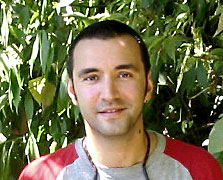Events & News
Stephen Kobourov wins Fulbright Scholarship
By
University Communications
May 11, 2006

Stephen Kobourov, an associate professor in the department of computer science at The University of Arizona, has been awarded a Fulbright Scholarship for the 2006-2007 academic year.
Kobourov will use the grant to help build curriculum and research culture in the department of computer science at the University of Botswana. He is a leading expert in information visualization, new areas in computer science that help scientists and other researchers quantify large amounts of data into easily readable pictures or animation. These areas draw on theory from information graphics, computer graphics, human-computer interaction and cognitive science.
Scientists and engineers can use interactive or animated digital images to make sense of mind-numbingly huge quantities of laboratory or simulation data or the results from sensors out in the field. Data mining, as one example, offers many abstract visualizations related to these visualization types.
Kobourov researches the visualization of mathematical graphs, tools that can be used to model a vast array of human interactions and activities, such as telephone traffic, disease transmission, airline scheduling and social networks such as MySpace and Facebook.
Applications of his work include robot deployment in hazardous environments and gene regulatory networks in biology.
In addition to the Fulbright, Kobourov's work is supported by a National Science Foundation Career Award.
Given the rapid integration of the Internet in developing countries and the range of computer skills needed in modern medicine, education, business and manufacturing industries, the department of computer science at the University of Botswana formed in 1992 to meet the growing need for skilled computer personnel in the country.
Life expectancy in Botswana, a country roughly the size of Texas and with a population of 1.6 million people, is about 34 years. The country also has a 40-percent unemployment rate, and the second highest rate of HIV/AIDS infection in the world. Despite this, Botswana's economic base has grown substantially since gaining independence from Britain in 1966. The University of Botswana, the nation's only higher education institution, was founded in 1982 and currently has almost 16,000 students and 800 faculty.
Kobourov plans to help build their department's international standing through undergraduate and graduate curriculum development, the transfer of research results and the involvement of undergraduates in research projects. His ultimate goal is to increase the number of students going on to advanced graduate study in computer science. At the UA, 18 undergraduates have authored 13 peer-reviewed research papers with Kobourov at the UA.
Kobourov, a native of Sofia, Bulgaria, has a bachelor's degree from Dartmouth in computer science and mathematics and a doctorate from Johns Hopkins. He joined the UA in 2000 as an assistant professor and has co-authored 59 journal and conference articles. In addition to his work on graph theory, Kobourov also has made contributions to the automatic detection of self-plagiarism in academic publications and to computer science education research.
In his spare time Kobourov enjoys learning new languages (including Spanish at the UA) and playing bass guitar with colleagues and graduate students in his garage band, The Zax.
Fulbright grants are made to U.S. citizens and nationals of other countries for a variety of educational activities, primarily university lecturing, advanced research, graduate study and teaching. The program is sponsored by the United States Department of State, Bureau of Educational and Cultural Affairs, and is the U.S. government's flagship program in international educational exchange.
